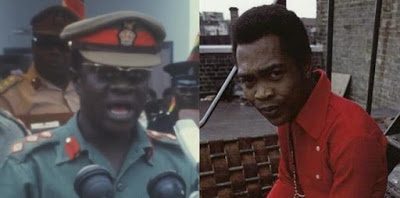African Military Rulers: Musician Fela Kuti and Ghana’s Colonel Acheampong

A lot of people think that Thomas Sankara was the only African military ruler who was liked and respected by Fela Anikulapo Kuti.
This is not true.
For sure, Sankara was the only military ruler with whom he had a genuine personal friendship, but Fela praised Idi Amin, the Ugandan military dictator. It was a controversial decision for which he received a good deal of criticism, but one that was predicated on Amin’s anti-imperialist stance and his frequent denunciations of Apartheid South Africa.
Fela also took a liking to the Ghanaian military Head of State, Colonel Ignatius Acheampong. This in many ways is not surprising given that Acheampong had overthrown Dr. Kofi Busia, an arch-enemy of Fela’s hero, Dr. Kwame Nkrumah, whom Fela had met as a child through his mother, Funmilayo Kuti.
Acheampong was known to be broadly sympathetic to Nkrumah’s ideology. His government “in the spirit of the January 13th (1972) Revolution” revoked the Busia government’s offer of a reward of $120,000 for anyone who could bring Nkrumah back to Ghana “Dead or Alive”. He declared a day of national mourning after Nkrumah’s death in exile, and was responsible for negotiating the return of Nkrumah’s remains to Ghana from Guinea. Acheampong had promised that Nkrumah would receive a burial befitting of his status as Ghana’s Founding Father.
An appreciative Fela dedicated a 1972 re-issue of his album Open and Close to “his Excellency I.K. Acheampong, Ghana Head-of-State, the first head-of-state I ever entertained. It was beautiful.”
But Fela’s respect for Acheampong would wane.
During a temporary sojourn in Ghana to which he had sought refuge after the sacking of his Kalakuta Republic commune by soldiers of the Nigerian Army, Fela actively supported the cause of Ghanaian student activists in their protest actions against Acheampong, whose initial sense of promise had degenerated into the sort of economic mismanagement and blatant corruption of which he had consistently accused Nigerian military regimes. His 1976 song “Zombie”, which lampooned the Nigerian military, became popular among dissident university students who felt the lash of persecution for opposing Acheampong. The uneasiness felt by the regime over the songs use as a rallying call against the Ghana military was compounded by Fela denunciation of Acheampong and his cohorts on stage at Accra’s Apollo Theatre.
Fela’s conduct culminated in his deportation from Ghana, an action that he felt was preceded by consultations between Acheampong and his Nigerian counterparts. Acheampong also imposed a travel ban on Fela which was not lifted until 1982 by the military regime headed by Flight Lieutenant Jerry Rawlings.
Fela did not visit Ghana and does not appear to have endorsed Rawlings despite the revolutionary inclinations of his first government and the early proclamations of a radical type during the second one. Nonetheless, he did become very friendly with Capitaine Thomas Sankara, the Marxist and Pan-Africanist orientated military leader of Burkina Faso, who was a regional ally of Rawlings. Sankara’s assassination is said to have devastated Fela who described his death as a “terrible blow to the political life of Africans.”
He remembered Acheampong far less fondly.
So embittered was Fela by his treatment at the hands of the Acheampong regime that when recalling the uprising that brought junior officers of the Ghanaian military to power in 1979 to his biographer, the Cuban-born Carlos Moore, Fela referred to “That Acheampong mother f ***er, who’s dead now. Got his ass kicked good by Jerry Rawlings!”
*
Note to readers: please click the share buttons above or below. Forward this article to your email lists. Crosspost on your blog site, internet forums. etc.
Adeyinka Makinde is a writer based in London, England. This article was originally published on his blog site, Adeyinka Makinde.
Featured image: Colonel Ignatius Acheampong and Fela Kuti

